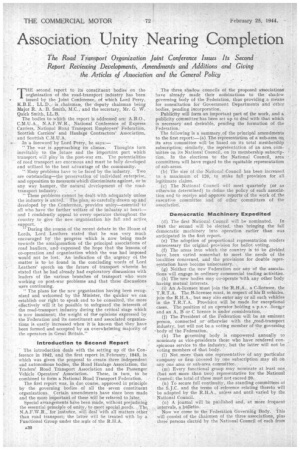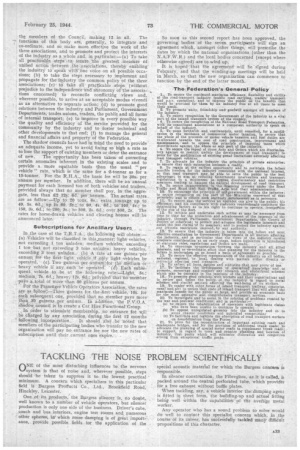Association Unity Nearing completion
Page 32

Page 35

If you've noticed an error in this article please click here to report it so we can fix it.
THE second report to its constituent bodies on the orgknization of the road-transport industry has been
• issued by the Joint Conference, of which Lord Perry, K.B.E., LL.D., is chairman-, the deputy chairman being Major R. A. B. Smith. M.C., and the secretary, Mr. G. W.
Quick Smith, LL.B: .
The bodies to which the report is addressed are: A.R.O., N.A.E.W.R., National Conference of Express Carriers, 'National Road Transport Employers' Federation, Scottish Carrie'rs' and Haulage Contractors' Association, and Scottish C.1),1.U.A.
In a foreword by Lord Perry, he says:— " The. war is approaching its climax. Thoughts tarn inevitably to. the future and the important part which transport will play in the post-war era. The potentialities of road transport are enOrmous and must he fully developed and utilized to the best advantage of the community.
" Many problems have to be faced by the industry. Two are outstanding—the-preservation of individual enterprise, and opposition to measures which discriminate against, or in any way hamper, the natural development of the road transport -industry.
" These problems cannot be dealt with adequately unless the industry is united. The plan, so carefully drawn up and developed by the ,Conference, provides unity—essential to ail who have the further, welfare of the inanstr.y at heart— and I confidently appeal to every operator throughout the country to give the new organization his full and active, support.
"'During the course of the recent debate in the House of Lords, Lord Leathers stated 'that he was very much encouraged by the progress which is now being made towards the amalgamation of the principal associations of road hauliers, • andexpressed the hope that the lessons, of co-operation and organization which the was had imposed would not be lost. An indication of the urgency of the matter is tobe found in the concluding words of Lord Leathers' speech on the future of transport wherein he stated that he had already had expldratory discussions with leaders of the various branches of transport who were working on post-war problems and that these discussions w,ere continuing.
" The plans for the new organization baying been recognized and welcomed by the Minister, the quicker we can establish our right to speak and to be consulted,. the more _ effectively will it be possible to safeguard the interest§ of the road-transport industry during the critical stage which
• is now imminent; the weight of the opinions expressed by the Federation and its constituent and associated organizations is vastly increased when it is known that they have been formed and -accepted by an overwhelming Majority of the operators in Great Britain."
Introduction to Second Report The introduction deals with the setting up cif the Con. ference in 1942, and the first report in, February, 1943, in which was given the proposal to create three independent and autonothous bodies, the Road Haulage Association, the Traders' Road Transport Association and the Passenger.
Vehicle Operators' Association. These, in turn, to be combined to form a National Road Transport Federation.
The first report was, in. due course, approved in principle by the governing bodies of all the seven Constituent organizations. Certain amendments have since been made and the more important of these 'will be referred to later.
Special arrangements have been made, withotit prejudicing the essential principle of unity, to meet special needs. The, N.A.F.W.R., for instance, will deal 'with all matters other' than road transport; the latter will he treated with by a Functional Group under the wgis of the R,II.A, .430 The three, shadow councils of the proposed associations have already made their no-initiations to the shadow governing body of the Federation, thus providing a means for consultation for Government Departments and Other bodies, pending incorporation.
Publicity will form an important part of the work, and a publicity committee:has been set up to deal with that which is necessary and desirable, pending the formation of the Federation.
The following is a summary,of the principfdamendments. to the first report:—(a) The representation of a sub-area on its area committee will -be based on its total membership subscription; similarly, the representation of an area com.
• mittee on its National Council, on its membership subscription. In the elections to the National Council, area committees will have regard to -the equitable representation of sub-areas.
(b) The size Of the National Council has been increased, to, a maximum of 126, to make full provision for all legitimate claims.
(c) The National Council 'will meet quarterly (or as otherwise determined) to define the policy of each associaction and to receiye and approVe reports of the work of the executive committee and ofother committees of the association.
Democratic Machinery Expedited (d) The first National Council will be nominated. In 1945 the second will be elected, thus bringing the full democratic machinery into operation earlier than was anticipated in the first report.
(e) The adoption of propOrtional representation renders unnecessary the original provision for ballot voting.
(f) The areas into which the country is tci be divided have, been varied somewhat to meet the needs of the localities &incerned, and the provisions for double representation have become unnecessary. (g) Neither the new Federation nor any of the associations will engage in ordinary commercial trading activities.
(h) The new bodies may co-operate with any other body having mutual inte.rests.
(i) An A-licensee must join the R.H,A., a C-licensee, the T,R.T.A. The:B-licensee must, in respect of his B vehicles, join the R.H.A., but may also enter any or all such vehicles in the T.R.T.A. Provision will be made for exceptional cases. The position of an operator holding a p.s.v. licerwe and an A, B or C licence is under' consideration.
(j) The .President of the Federation will be an eminent person, connected or -otherwise with. the road-transport industry, but will not be a voting member of -the governing
'body of the Federation.: •.
(k) The governing body is empowered. annually to nominate as vice-presidents those who have rendered conspicuous service to the industry, but the latter will not be voting members of that body.
(I) Not more than one representative of any particular company or firm Covered by one subscription may sit on any one area or sub-area committee. . (m) Every functional group may nominate at least one (but not more than two) representative for the National Council; the total of these must not exceed 20., (n) To secure full continuity, the standing committees of the S.J.C. and the terms of reference relating thereto will be adopted by the R.H.A., urqess and until-varied by the National Council. .
(a) A journal will be published and, at more frequent intervals. a . .
Now we Come to -the Federation Governing Body. This will consist of the chairmen of the three associations, plus three' persons elected by the National Council of each from
the members of the Council, making 12 in all. The functions of this body are, generally, to integrate and co-ordinate, and so make more effective the work of the three associations, and to promote and protect the interests of the industry as a whole and, in particular:—(a) To take all practicable steps to secure the greatest measure of unified action •between the associations, thereby enabling the industry to speak with ,one voice on all possible occasions; (b) to take the steps necessary to implement and
• propagate for theindustry the common policy of the three associations; (c)to take all practicable steps (without prejudice to the independence and antonomy of the associations concerned) to reconcile conflicting views and, wherever possible, to arrive at an acceptable modus vivendi as an alternative to separate action; (d) to promote good relations between the industry and Parliament, Government Departments, trades unions, traders, the public and all forms of internal transport; (e) to improve in every possible way the quality and efficiency of the service provided for the community by the industry and to foster technical and other developments to that end; (f) to manage the general and financial affairs and property of the Federation,
The shadow councils have had in mind the need to provide an adequate income, yet to avoid fixing so high a rate as to lose the support of existing members or deter the entrance
of new. The opportunity has been takeni of correcting certain anomalies inherent in the existing scales and to provide a more equitable basis than the usual "per vehicle " rate, which is the same for a g-tonner as for 'a 15-tonner. Por. the R.H.A., the basic fee will be 305. per annum per mgmber. In addition, there will he an annual payment for each licensed ton of both vehicles and trailers, provided always that no member shall pay, in the aggregate, less than £2 12s: 6d. per ,annum. The actual rates are as follow:—Up to 20 tons, 65.; extra tonnage up to 40, 5s. 6C1.; up to 60, 55.; to 30, 4s. Rd.; to 100, 4s.; to 150, 3s. 6d.; to 200, 3s.; to 500, 2s. 6d.; over 500, 2s. The rates for horse-drawn vehicles and clearing houses will be
announced later. ` Subscriptions for Ancillary Users,
In the case of the T.R.T.A., the 'following will obtain:— a) Arehicks will be classified in this,rnanner: light vehkles, not exceeding 1 ton unladen; medium vehicles, exceeding 1 ton but not exceeding 3 tons unladen; heavy vehicles. exceeding 3 tons unladen. (b) A. rate at one guinea per annum for the firSt light vehicle if only light v'ehiCleS be operated. (c). Two guineas per .annum for the medium or heavy vehicle if any such be oper=a.teci. (S) Each subsequent vehicle to be at the following rate:—Light, 5%; medium, 7s. 6d.; heav,y, 12s, pd.; prewided that no member paYs a total of more than 30 guineas per annum. For the Passenger Vehicle Operators Association, the rates are as follow;—Three guineas for the first vehicle,' 10S for each subsequent one provided that no member pays more 'than 30 guineas per annum. In addition, the P.V.O.A. shadOw council is £0 create a Car Hire Functional Group. In Order to stimulate membership, no entrance fee be charged by any association during the first 12 months ' following incorporation. It should also be noted that members of the participating bodies who transfer to the new organization will pay no entrance fee nor the new 'rates ofsubscription until their current ones expire.




















































